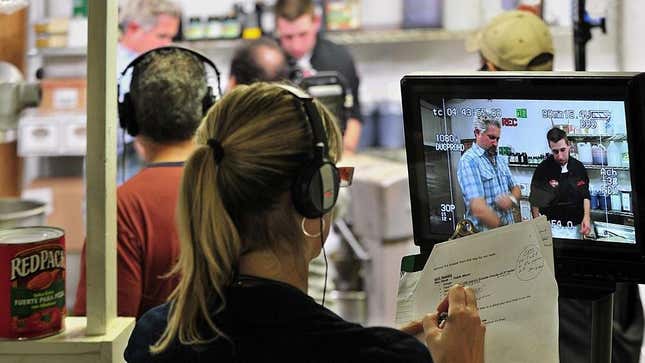
Before I made The Takeout my home, I spent a good amount of time cheffing it up on television. My bright, shining face regularly popped up around the greater Food Network universe (including a hellish experience on Chopped). I’ve filmed cooking segments that have aired across the world. When Nick Lachey hosted a morning show on VH1, I used to show up every few weeks to make his most delicious dreams come true. (He told me I was his favorite guest, and why would Nick Lachey lie?)
Just like everything else that happens on television, cooking on camera isn’t the same as doing so in real life. You’re not making food; you’re making entertainment. Here are some of the behind-the-scenes secrets I’ve learned along the way.
Cooking on TV can be tedious
My husband and I used to own a semi-famous bakery that never made an appearance on Diners, Drive-Ins and Dives, but it did appear on a few other shows that followed the same exact format. Our segments ran about 3-4 minutes, and each one took between 8-12 hours to film. How is that even possible? I can barely remember, because I was so goddamn bored that my brain didn’t bother to record any behind-the-scenes footage to look back on later.
My husband, on the other hand, has a photographic memory for minutiae and remembers all. He regaled me with a riveting story about our appearance on Cooking Channel’s Unique Eats, and how it took us 15 minutes to film a three-second snippet of honey-bourbon caramel slowly dripping from a spoon. We filmed about 25 more of these “money shots,” as the director called them, featuring things like drizzling ganache and heavy cream streaming into a bowl super slowly. Yes, it was tedious, but I do have to admit that the final cut was unnervingly erotic.
“Reality” isn’t all that real
I’m sure you already know this (at least I hope you do), but if you didn’t know that reality TV isn’t true to life, well, I’m sorry to break the bad news. These shows are unscripted, which means instead of a script, the (mostly unpaid) talent have their dialogue prompted by producers. Prior to filming unscripted shows, a participant such as myself must fill out pages of questionnaires for the producers to get to know me without ever meeting me in person; once you get on set, you and the producer(s) become fast friends. They’re always off screen asking questions about your life story, guiding your narrative to where they want it to go, and on occasion directly feeding you lines.
But sometimes, “reality” is very real
On broadcast television, everything is tightly controlled by a pack of suits that are beholden to advertisers, so if something extra hilarious happens in reality, it probably won’t make it into “reality” programming. Online, though, it’s a different story for independents and networks alike; because the demographics skew younger and hipper, and the cool kids are all about the lulz, the networks can let more things slide.
If you’re good friends with your costars you can make some serious TV magic happen, because you’re not under strict orders not to fuck around, and regardless, no network can smother the heat of genuine kitchen chemistry. Meanwhile, if you’re on a set full of strangers, being warm, generous, and friendly to every single person on both sides of the camera can make things “click,” which turns a middling cooking segment into the sort of thing you’d be proud to show your children.
People love to see you fail
I love doing live TV, precisely for the reason most people hate it: it can easily go off the rails, and once it does, you have no choice but to roll with it. In fact, I pray that something will end up going catastrophically wrong on-air, because that’s entertainment, baby. Who wants to watch someone blithely make a salad? No one. Who wants to see a salad explode into flames on live television? Everybody. As long as you keep your cool and play the cards you’re dealt, the audience will eat it up. And if they find your failures funny enough, you may very well get invited back to humiliate yourself on television again.
It’s not always glamorous
We shot one spot at the bakery on a 100-degree day the middle of July, and we weren’t allowed to turn on the air conditioner because it made too much noise, and the hair and makeup situation became a lost cause. In the finished segment we both looked like we had just stepped in from the rain, with my naturally wavy hair having grown six sizes, and my husband’s hair glued to his scalp with sweat. My lipstick melted, my eye makeup dissolved. When the segment aired we noticed white splotches on Matt’s big red beard, and realized they were actually clumps of white lint from the towels they were using to blot his face dry between takes. Hollywood, you have our number.